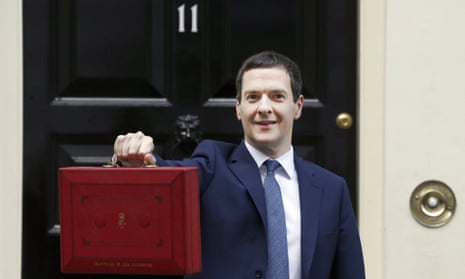The nation’s credit card has been maxed out. The government failed to fix the roof while the sun was shining. When times are tough a country has to tighten its belt and live within its means. Remember all that? Of course you do. Those were some of George Osborne’s favourite soundbites in 2010 when he was pinning the blame for the global financial crisis on Labour’s profligacy. And mighty effective they were.
But it was as if austerity – and the justification for it – had all been a bad dream when Jeremy Hunt and Boris Johnson had their televised head-to-head on Tuesday. During the battle for No 10 both men have abandoned their fealty to budgetary discipline and sprayed around pledges to sort out social care, boost police numbers, increase defence spending and deliver whopping great tax cuts. ITV viewers were able to witness the full extent of their U-turns.
Hunt’s plans involve a cut in corporation tax from 19% to 12.5%, costing £13bn a year according to the Institute for Fiscal Studies, while the price tag for Johnson’s idea to raise the threshold for the 40% rate of income tax from £50k to £80k is £9bn a year. Both say they want to raise the point at which people start paying national insurance, which doesn’t come cheap either.
All this, of course, at a time when the economy is listing, the financial markets look ripe for serious trouble, and Britain is less than four months away from a new Brexit deadline. Both Hunt and Johnson are planning to use fiscal policy – tax and spending – to counteract any negative economic shock caused by Britain’s EU departure, which was precisely what the Labour government did when the banks had their near-death experience in 2008. The new Tory approach to fiscal policy will bring a wry smile to the lips of Gordon Brown, pilloried as he was by Osborne for his alleged spendthrift behaviour a decade ago.
Johnson and Hunt appear to have come round to Brown’s way of thinking: namely that when times are tough the government supports the economy; that if the private sector is reluctant to invest, then cutting public investment makes matters worse; and that if the extra spending or the lower taxes generate a sufficient return, the extra borrowing eventually pays for itself.
Naturally enough, the two men vying to replace Theresa May say that their sensible proposals are quite different from Labour’s recklessness, because conditions today are materially different from those of 2007-2010, when Brown was prime minister. This argument doesn’t really stand up to scrutiny.
The government plans to borrow just over 1% of GDP this year to fill the gap between what it spends and the money it rakes in. To be fair, that’s slightly less than the deficit when the financial crisis broke in 2007, but not by much. On the other hand, the national debt – the sum of the annual deficits and (increasingly rare) surpluses going back centuries – has more than doubled over the past decade to more than 80% of GDP. And all the other sources of money to finance tax cuts – North Sea oil, council houses, nationalised industries – are no longer there. The country’s underlying financial position is considerably worse than it was when Brown was in charge.
There is a school of economics that says budget deficits need not be a constraint because the government can tell the Bank of England to create new money to fund its spending. But since neither Hunt nor Johnson has yet come out as an advocate for modern monetary theory, the assumption has to be that they would finance their tax cuts through higher borrowing. And that exposes the deficit-reduction strategy of the past 10 years for the wrong-headed, politically motivated and self-defeating exercise it always was.
The damage caused by austerity – evident in the rising projections for child poverty, violence in prisons, longer NHS waiting lists and closures of care homes caused by cuts to local government spending – means that the Hunt/Johnson tax cuts are spectacularly inappropriate. Corporation tax has been cut from 28% since 2010 without any discernible improvement in the willingness of companies to invest, while raising the 40% income-tax threshold would benefit the four million taxpayers with the highest income. Opinion polls suggest schools and hospitals are a higher priority for voters than tax cuts.
Even so, the race to the bottom on tax is in some sense welcome. For a start, it validates the use of tax and spending as an economic tool. Since 2010, there has been far too great a reliance on the Bank of England to stimulate the economy through ultra-low interest rates and the money-creation process known as quantitative easing. What’s more, the terms of the political debate will now change as a result of the clear desire of Johnson and Hunt to draw a line under the austerity years. Tony Blair’s success in both the 2001 and 2005 elections had much to do with the ability to frame the choice for the electorate as between Tory tax cuts and higher Labour spending on public services.
Just as an example, the all-party parliamentary group on wellbeing economics recently published a report calling for £10bn a year of higher spending in areas including mental illness, further education, social care and prisons. The thinking behind the report – that national wellbeing is more important than growth, and that happier people are more productive people – is sound, but it would have sunk without trace a few years back. Now, thanks to Hunt and Johnson, there is a chance that it won’t.

